September 8, 2025

The article highlights nine essential steps for effective BCBA (Board Certified Behavior Analyst) training and certification. With the demand for qualified professionals on the rise, obtaining a relevant graduate degree is paramount. Completing supervised experience and passing the certification examination are crucial milestones that pave the way for a successful career in behavior analysis. Furthermore, engaging in continuing education ensures that practitioners remain at the forefront of the field.
Each step is backed by data and insights, illustrating how these elements contribute to professional success. The increasing demand for BCBAs underscores the importance of networking, mentorship, and staying informed about industry trends. Are you facing challenges in hiring qualified behavior analysts? Consider how utilizing Hire ABA can streamline your recruitment process and connect you with top talent in the field.
By following these nine steps, you not only enhance your qualifications but also position yourself favorably within a competitive job market. Embrace the opportunities that arise from a well-rounded training and certification process, and take action today to secure your future in behavior analysis.
The field of Applied Behavior Analysis (ABA) is witnessing remarkable growth, with the demand for Board Certified Behavior Analysts (BCBAs) projected to surge by 25% in the coming years. This increase underscores the significance of effective BCBA training and certification, presenting a unique opportunity for aspiring professionals to forge rewarding careers. Yet, navigating the intricacies of certification can be overwhelming.
What essential steps must candidates undertake to ensure their success in this competitive landscape? This article explores nine crucial steps that will empower individuals on their journey to becoming certified BCBAs, equipping them with the knowledge and skills necessary to excel in this vital field.
The demand for Board Certified Behavior Analysts (BCBAs) is on the rise, with a projected 25% increase in job opportunities by 2026. To become a Board Certified Behavior Analyst, undergoing BCBA training and obtaining a relevant graduate degree is crucial. Programs such as a Master’s in Applied Behavior Analysis, Psychology, or Education must be accredited by the Association for Behavior Analysis International (ABAI) to meet qualification requirements. This educational foundation not only equips candidates with a vital understanding of behavior analysis principles but also significantly influences their success in achieving the credential.
In fact, approximately 80% of BCBA candidates possess relevant graduate degrees, underscoring the importance of advanced education in this field. Furthermore, graduates from accredited programs are better positioned to pass certification exams, with many achieving success within their first year post-graduation.
The is around $68,000, while board-certified behavior analysts can earn between $51,000 and $80,000 annually. As the demand for qualified BCBAs continues to rise, pursuing an accredited graduate program in BCBA training is a strategic step toward a rewarding career in Applied Behavior Analysis.
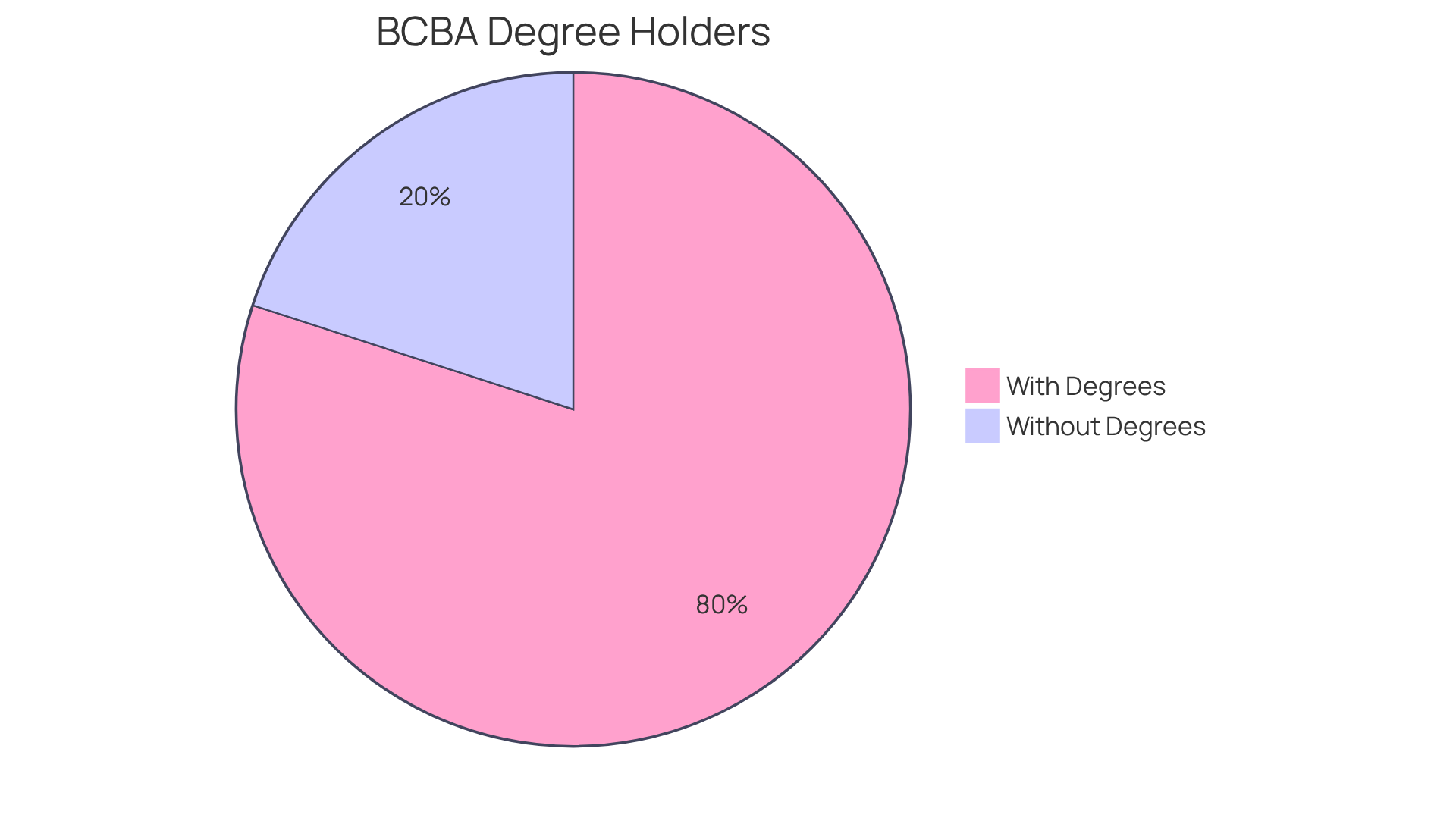
With a projected increase of 25% in demand for Board Certified Behavior Analysts (BCBAs) by 2026, the need for qualified professionals in this field is more critical than ever. To become a Board Certified Behavior Analyst, it is essential to complete BCBA training that involves accumulating supervised experience in behavior analysis. Candidates must fulfill a minimum of 1,500 hours under the guidance of a certified behavior analyst. This hands-on experience is crucial for translating theoretical knowledge into practical skills, enabling candidates to navigate the complexities of client interactions across diverse environments, including schools and clinics.
Studies indicate that candidates who participate in BCBA training through supervised experience have a significantly higher chance of passing the behavior analyst exam, underscoring the importance of practical training in developing effective clinical skills. Furthermore, this immersive BCBA training not only enhances understanding of behavior analysis principles but also equips future professionals to effectively address the unique needs of individuals with behavioral disorders.
Ongoing professional development and continuing education are essential for sustaining certification, ensuring that practitioners stay updated with the latest advancements in the field. To support BCBAs in their career journey, Hire ABA offers that leverage advanced job fit scoring. Are you facing challenges in finding the right role? This service ensures that candidates are matched with the best positions that align with their skills, preferences, and desired locations, optimizing their job search in the ABA therapy landscape. Take the next step in your career with Hire ABA and secure your future in this growing field.
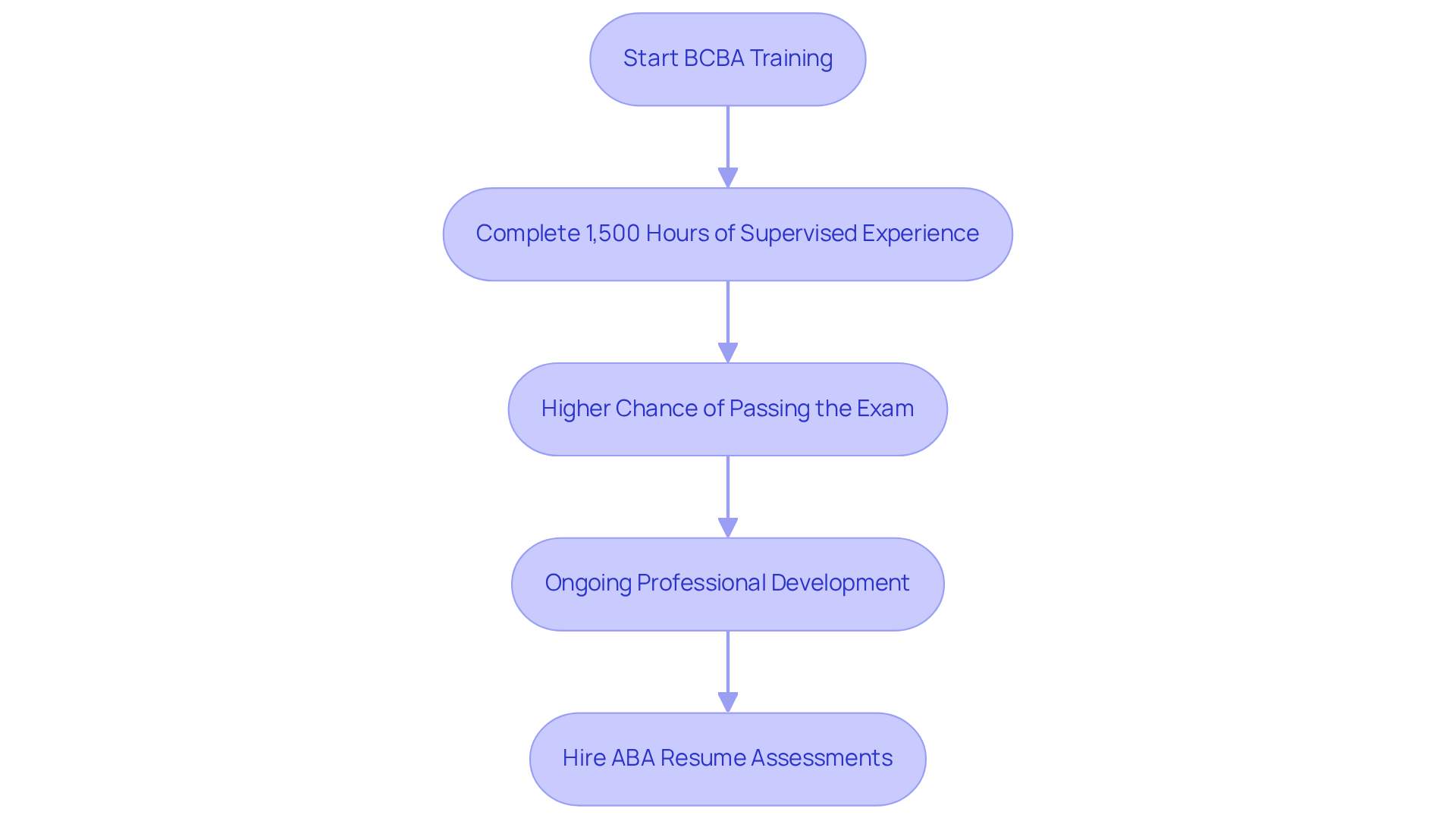
After completing your supervised experience, the next critical step is to pass the certification examination, which evaluates your grasp of behavior analysis principles, ethical considerations, and practical applications. Did you know that candidates who invest adequate study hours tend to perform significantly better? Thorough preparation is essential; utilizing study guides, , and review courses can greatly enhance your chances of success. Recent data shows that first-time test-takers achieve an average pass rate of approximately 65%. Notably, candidates from accredited programs experience even higher success rates, with a pass rate of 67% for first-time candidates from accredited programs compared to 49% for those from non-accredited programs. Obtaining a passing score, generally around 76% or more on the 185 multiple-choice questions, is crucial for earning your credential and practicing independently.
Engaging in structured study plans, breaking down content into manageable sections, and employing varied study techniques can further bolster your readiness for this pivotal examination. Additionally, have you considered seeking feedback from peers or mentors? Incorporating practice exams and simulation software can help familiarize you with the exam format and effectively assess your knowledge.
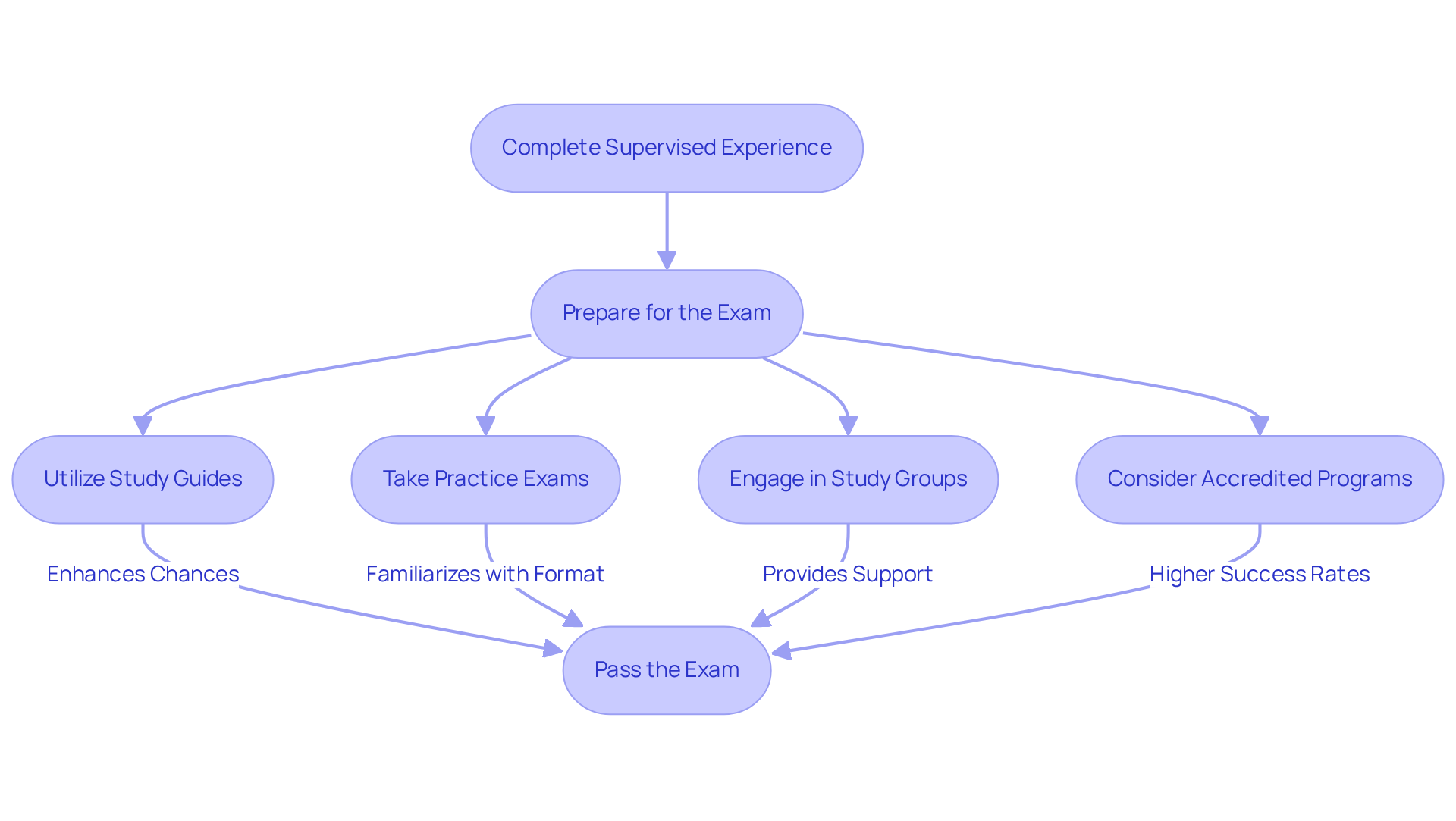
[BCBA training](https://hireaba.today/how-we-work) is essential for maintaining certification, which is crucial for credibility and effectiveness in the field of Applied Behavior Analysis (ABA). Board Certified Behavior Analysts are required to complete 32 continuing education units (CEUs) every two years, with a minimum of four hours dedicated to ethics. Engaging in various educational activities—such as workshops, conferences, and online courses—along with BCBA training, not only satisfies these requirements but also ensures practitioners are updated on the latest research, techniques, and ethical standards in ABA therapy.
Recent trends indicate that behavior analysts typically complete an average of 20 to 25 CEUs annually, reflecting a strong commitment to professional growth. Workshops and conferences, like the annual ABAI Convention, provide valuable opportunities for networking and learning, often offering CEUs for attendance. Furthermore, many organizations and universities offer online courses for BCBA training that are BACB-approved, enabling behavior analysts to earn credits at their own pace.
For BCBAs in supervisory roles, it is crucial to note that they must complete an additional three CEUs in supervision within the two-year period. Effective tracking methods—such as utilizing Excel spreadsheets or platforms like CEU Smart Hub—can assist individuals in managing their continuing education efficiently. Additionally, the BACB allows a grace period for reinstatement, underscoring the importance of timely completion of CEUs to prevent credential expiration.
The significance of career growth cannot be overstated; it directly affects the maintenance of BCBA credentials and enhances the quality of care provided to clients. By prioritizing ongoing education, behavior analysts fulfill certification requirements and contribute to their own development and the advancement of the field through BCBA training.
![]()
In the rapidly evolving field of ABA therapy, the demand for BCBA training is surging, leading to a 30-35% annual increase in job postings for Board Certified Behavior Analysts (BCBAs). Once certified, leveraging Hire ABA can significantly enhance your job search. This specialized platform connects BCBAs with employers who are actively seeking qualified professionals. By creating a profile and uploading your resume, you gain access to a diverse array of job opportunities tailored to your skills and experience.
With an overall over the next ten years, utilizing Hire ABA ensures you stay ahead in a competitive market. The platform not only provides job listings but also valuable resources, including:
Are you facing challenges in your job search? Hire ABA empowers you to make informed career decisions in this rapidly growing field, positioning you for success. Take action now—create your profile and unlock your potential in the ABA therapy landscape.

BCBA accreditation offers various pathways tailored to candidates' educational backgrounds and experiences. For those holding a Master's degree in behavior analysis or a related field, the standard qualification route is available. However, candidates with non-traditional degrees can still qualify by completing additional coursework or gaining supervised experience. For instance, individuals with degrees in psychology or education can enhance their qualifications through specialized courses in behavior analysis, thus meeting credentialing requirements.
Statistics reveal that candidates graduating from accredited programs achieve significantly higher pass rates on the certification exam. First-time test-takers from these programs boast a pass rate of 67%, compared to just 49% for those from non-accredited programs. This highlights the critical importance of choosing the right educational path.
Furthermore, alternative routes to BCBA qualification exist for individuals who may not conform to traditional criteria. For example, those with relevant work experience in behavioral health can leverage their practical knowledge to satisfy specific qualification requirements. Understanding these diverse options is essential for aspiring board-certified behavior analysts, enabling them to navigate their certification journey effectively while aligning their educational objectives with their professional aspirations.
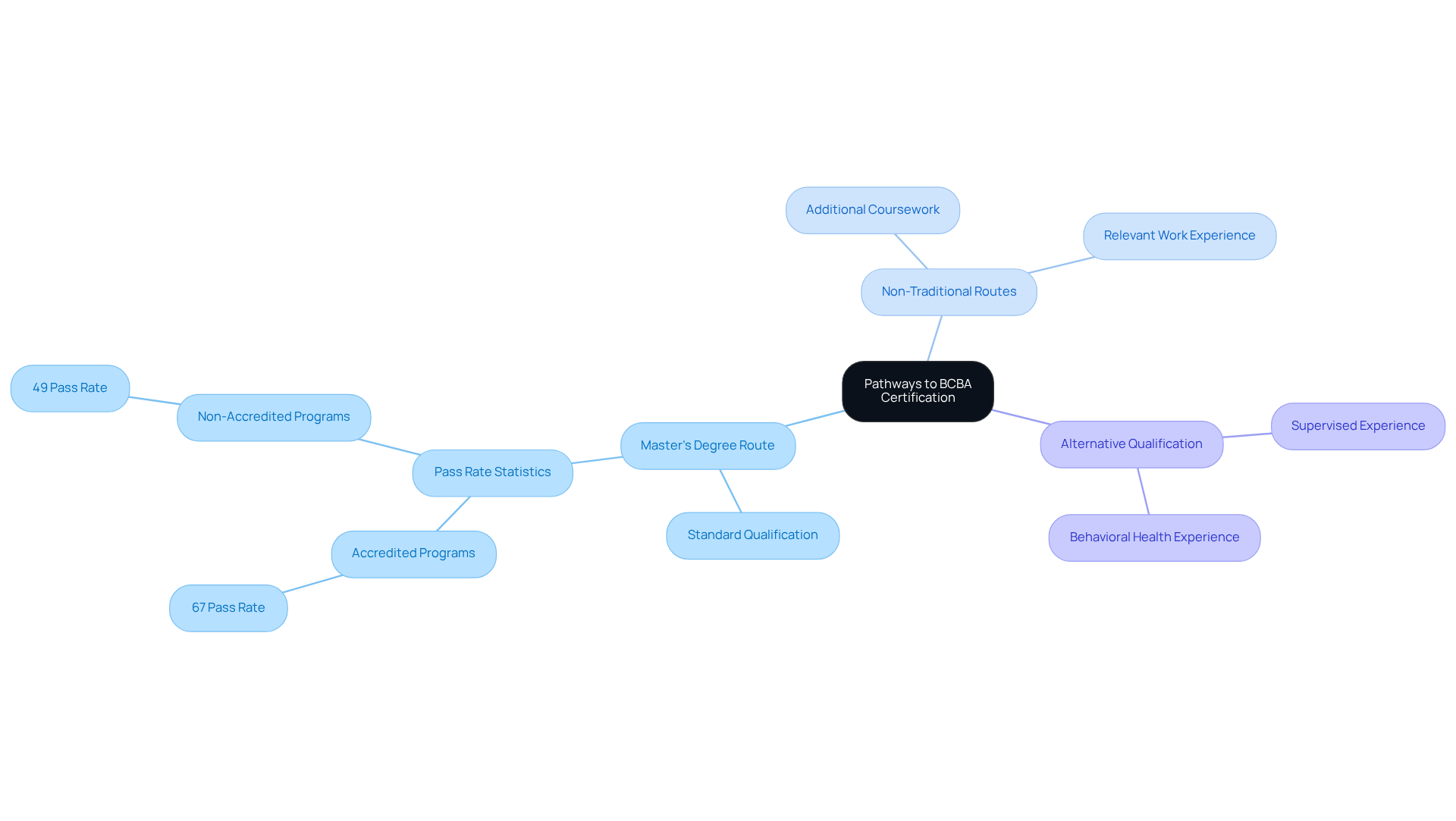
Preparing for [BCBA training](https://hireaba.today) demands a . Begin by developing a study schedule that dedicates time to each subject area encompassed by the exam. Leverage resources such as:
to solidify your understanding of BCBA training. Consider practicing with exams, as they are invaluable for familiarizing yourself with the exam format and pinpointing areas that require further review. Consistent and focused study will significantly enhance your likelihood of passing on your first attempt.
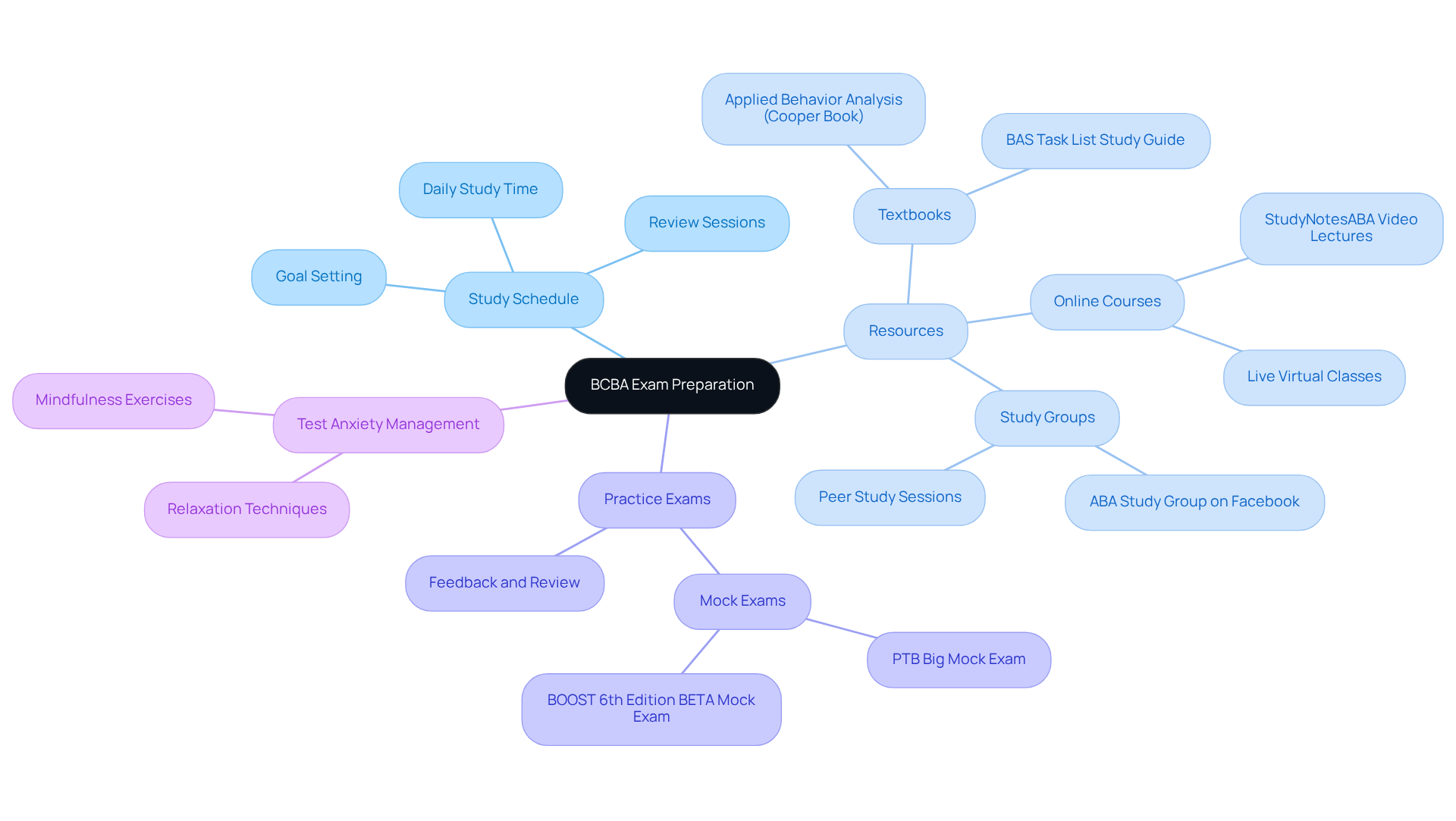
Networking within the ABA community is essential for enhancing career prospects for Board Certified Behavior Analysts (BCBAs). Did you know that nearly 100% of experts assert that face-to-face meetings are crucial for sustaining long-term business relationships? This statistic underscores the significance of in-person interactions. Participating in conferences, workshops, and local meetups allows individuals to connect with peers and industry leaders, nurturing relationships that can lead to mentorship and collaboration. Additionally, engaging in online forums and social media groups focused on ABA provides valuable insights and opportunities for career development.
Consider this: studies indicate that 85% of jobs are filled through networking. This highlights the in the job placement process. However, challenges such as time constraints and pandemic-related stigma can hinder networking efforts. By actively building these connections, behavior analysts can significantly enhance their career trajectories and remain competitive in a rapidly evolving field.
As Melitta Campbell aptly states, "Networking is the No. 1 unwritten rule of success in business. Who you know really impacts what you know." Now, reflect on your current hiring challenges. How can you leverage the power of networking to overcome them and elevate your career in ABA?
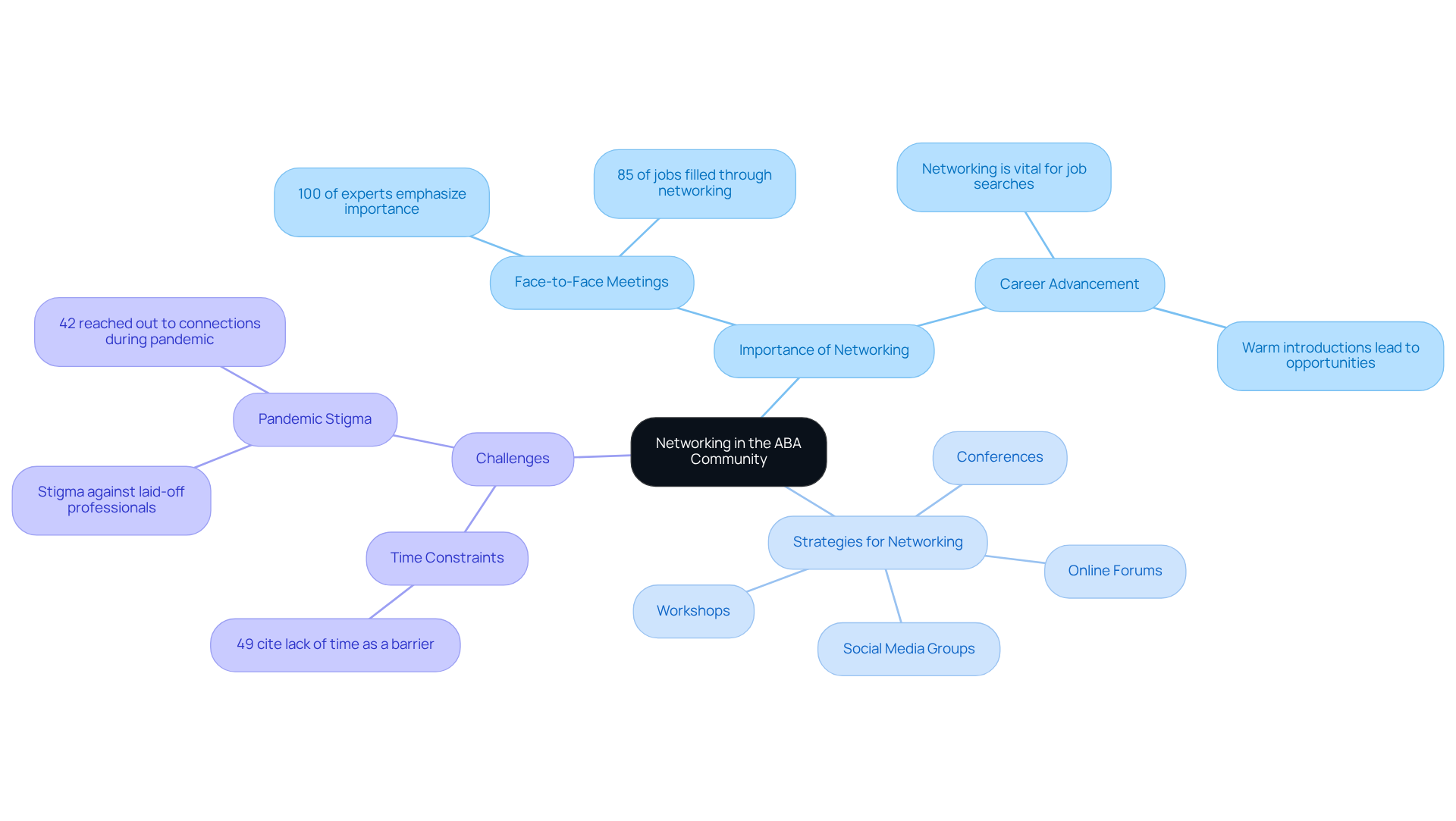
Engaging with experienced BCBAs as mentors can significantly transform your career journey. Did you know that mentorship in the field of behavior analysis can greatly enhance your professional trajectory? A mentor offers invaluable guidance on best practices, ethical dilemmas, and strategies for career advancement. They provide constructive feedback that helps you identify and address your faults, fostering personal growth and professional development.
Creating a mentorship connection not only boosts your confidence and skills as a behavior analyst but also fosters a passion for continuous learning and service excellence in the field. This supportive dynamic positively impacts the quality of care you deliver to clients and encourages you to become a mentor yourself, contributing to the cyclical nature of mentorship in the field. Furthermore, mentorship has been shown to improve employee engagement and retention rates, highlighting its broader organizational benefits.
To seek mentorship effectively, consider exploring platforms like Qooper or MentorCruise to who can guide you on your journey. Are you ready to elevate your career through mentorship? The time to act is now.
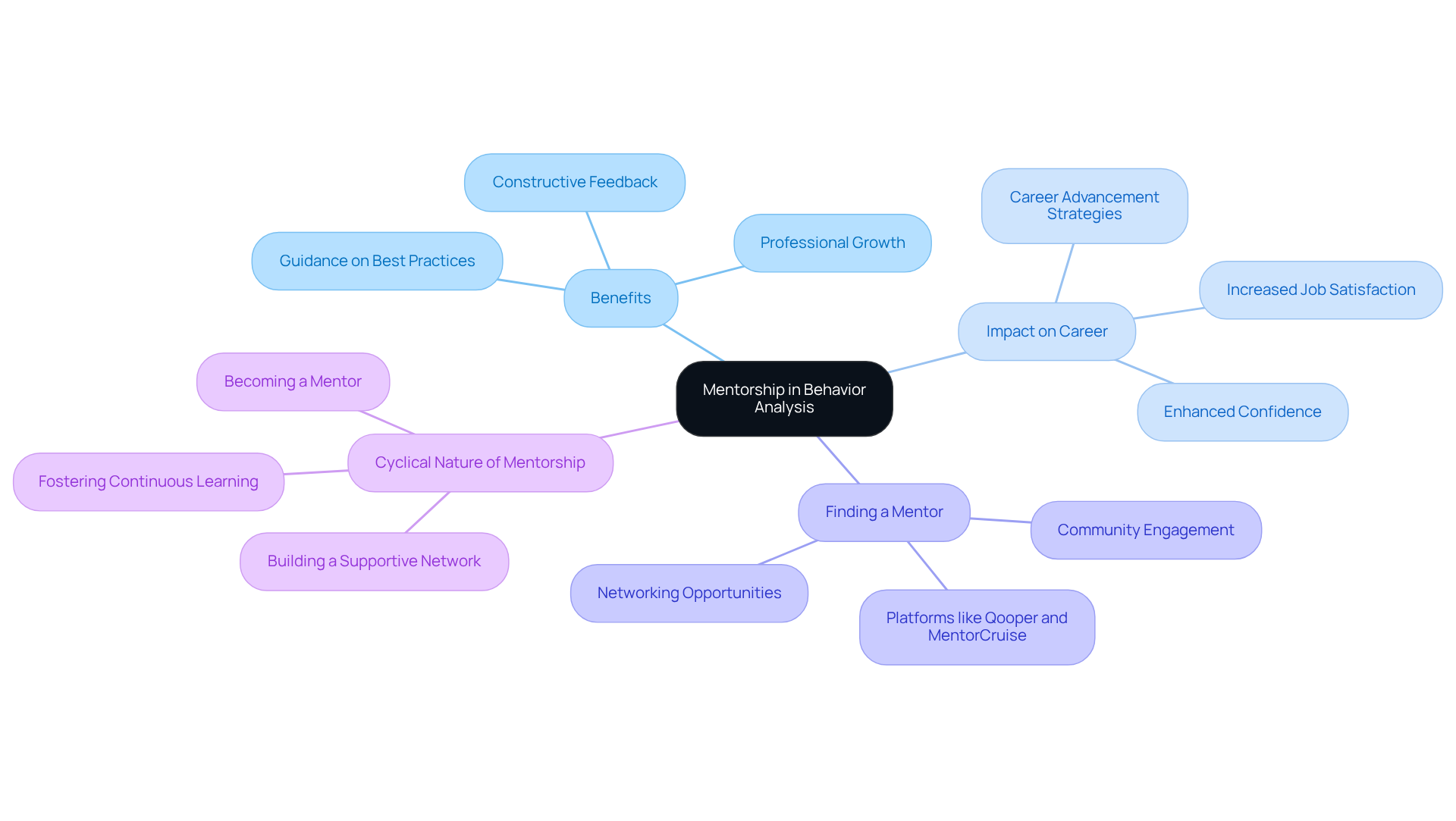
To remain effective as a BCBA, it is crucial to stay informed about the latest trends and developments that are relevant to in the field of ABA therapy. Did you know that the need for behavior analysts is projected to increase by around 22% by 2029? This statistic underscores the growing demand for skilled professionals in our field. To keep your knowledge current, consider the following:
Engaging with ongoing research and emerging practices, such as the integration of AI and telehealth in service delivery, will not only enhance your skills but also improve the quality of care you provide to your clients.
Ongoing education, such as BCBA training, is essential for succeeding in this dynamic field. Research suggests that behavior analysts who actively seek ongoing education, including BCBA training, are more effective in their positions. Involvement in continuing education programs has demonstrated a significant rise in effectiveness. By prioritizing ongoing education through BCBA training, BCBAs can adapt to the evolving landscape of behavior analysis and ensure they are equipped to meet the diverse needs of their clients. Consider how you can leverage these opportunities to elevate your practice and better serve those who rely on your expertise.
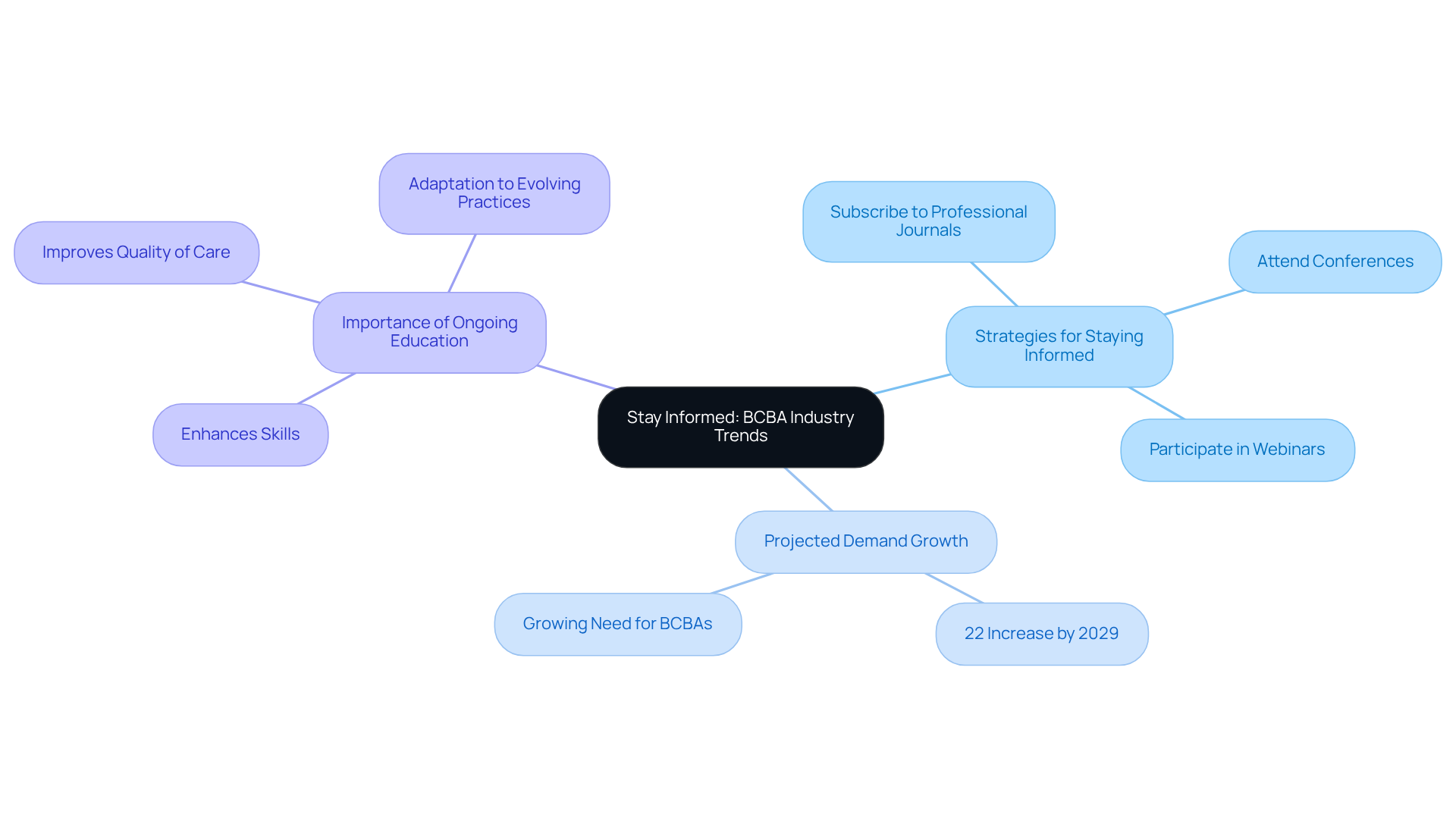
The demand for Board Certified Behavior Analysts (BCBAs) is surging, making this journey not just a career choice but a vital contribution to the field of Applied Behavior Analysis. Aspiring BCBAs must navigate a multifaceted process that requires dedication and strategic planning. By understanding and following essential steps—such as:
they can effectively chart their path to certification and success.
Choosing accredited programs is paramount. Hands-on experience is not just beneficial; it is necessary for developing the skills required in this field. Networking and mentorship play a crucial role in fostering professional growth. Have you considered how these elements can enhance your journey? Utilizing resources like Hire ABA can streamline your job search, connecting qualified candidates with employers in a rapidly expanding market.
Staying informed about industry trends and continuing education opportunities is crucial for maintaining certification and enhancing the quality of care provided to clients. The commitment to ongoing learning and professional development fulfills certification requirements and contributes to the growth of the ABA field. For those pursuing BCBA certification, embracing these essential steps will pave the way for a rewarding career dedicated to improving the lives of individuals with behavioral challenges.
Take proactive measures today. Explore how Hire ABA can assist you in navigating this dynamic world of behavior analysis, ensuring a brighter future in your professional journey.
What is the first step to becoming a Board Certified Behavior Analyst (BCBA)?
The first step to becoming a BCBA is to earn a relevant graduate degree, such as a Master’s in Applied Behavior Analysis, Psychology, or Education, from an accredited program by the Association for Behavior Analysis International (ABAI).
Why is obtaining a relevant graduate degree important for BCBA candidates?
Obtaining a relevant graduate degree is important because it equips candidates with essential knowledge of behavior analysis principles and significantly influences their success in passing certification exams. Approximately 80% of BCBA candidates hold such degrees.
What is the projected job growth for BCBAs by 2026?
The demand for BCBAs is projected to increase by 25% by 2026.
What is the average salary for individuals with a Master’s degree in Applied Behavior Analysis?
The average salary for individuals with a Master’s degree in Applied Behavior Analysis is around $68,000.
What are the requirements for supervised experience to become a BCBA?
Candidates must complete a minimum of 1,500 hours of supervised experience under the guidance of a certified behavior analyst to qualify for BCBA certification.
How does supervised experience impact the chances of passing the BCBA exam?
Candidates who complete supervised experience have a significantly higher chance of passing the BCBA exam, as this practical training enhances their clinical skills and understanding of behavior analysis principles.
What is the average pass rate for first-time BCBA test-takers?
The average pass rate for first-time test-takers is approximately 65%, with candidates from accredited programs achieving a pass rate of 67%.
What study strategies can help candidates prepare for the BCBA examination?
Candidates can enhance their preparation by utilizing study guides, practice exams, review courses, engaging in structured study plans, and seeking feedback from peers or mentors.
What is the passing score required on the BCBA exam?
A passing score of around 76% or more is required on the BCBA exam, which consists of 185 multiple-choice questions.
What ongoing requirements must BCBAs fulfill to maintain their certification?
BCBAs must engage in ongoing professional development and continuing education to stay updated with the latest advancements in the field.
Our expert recruitment strategies and AI-driven sourcing ensure that you receive top-notch candidates quickly, without compromising on quality. Whether you’re looking for BCBAs, Clinical Directors, or RBTs, we’ve got you covered.